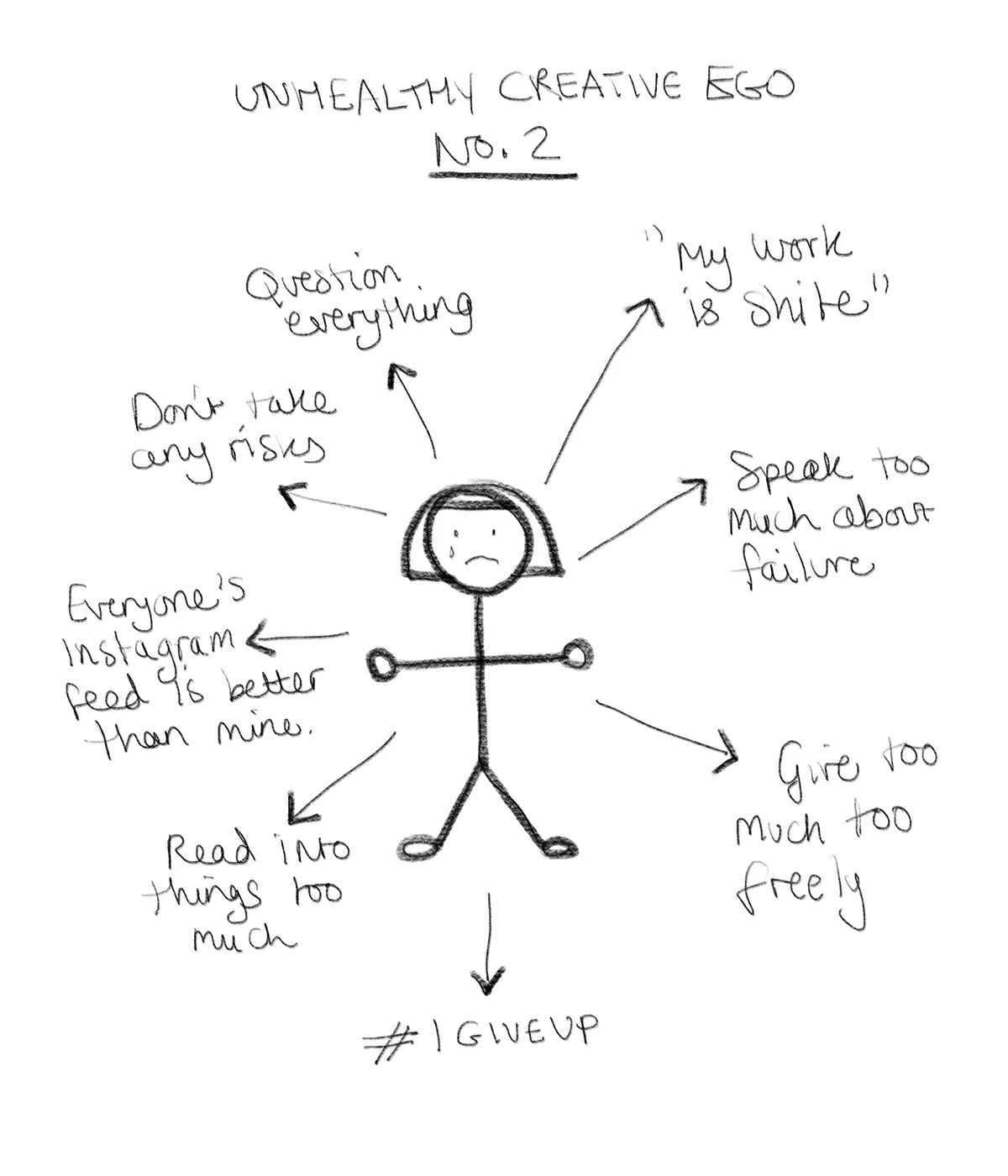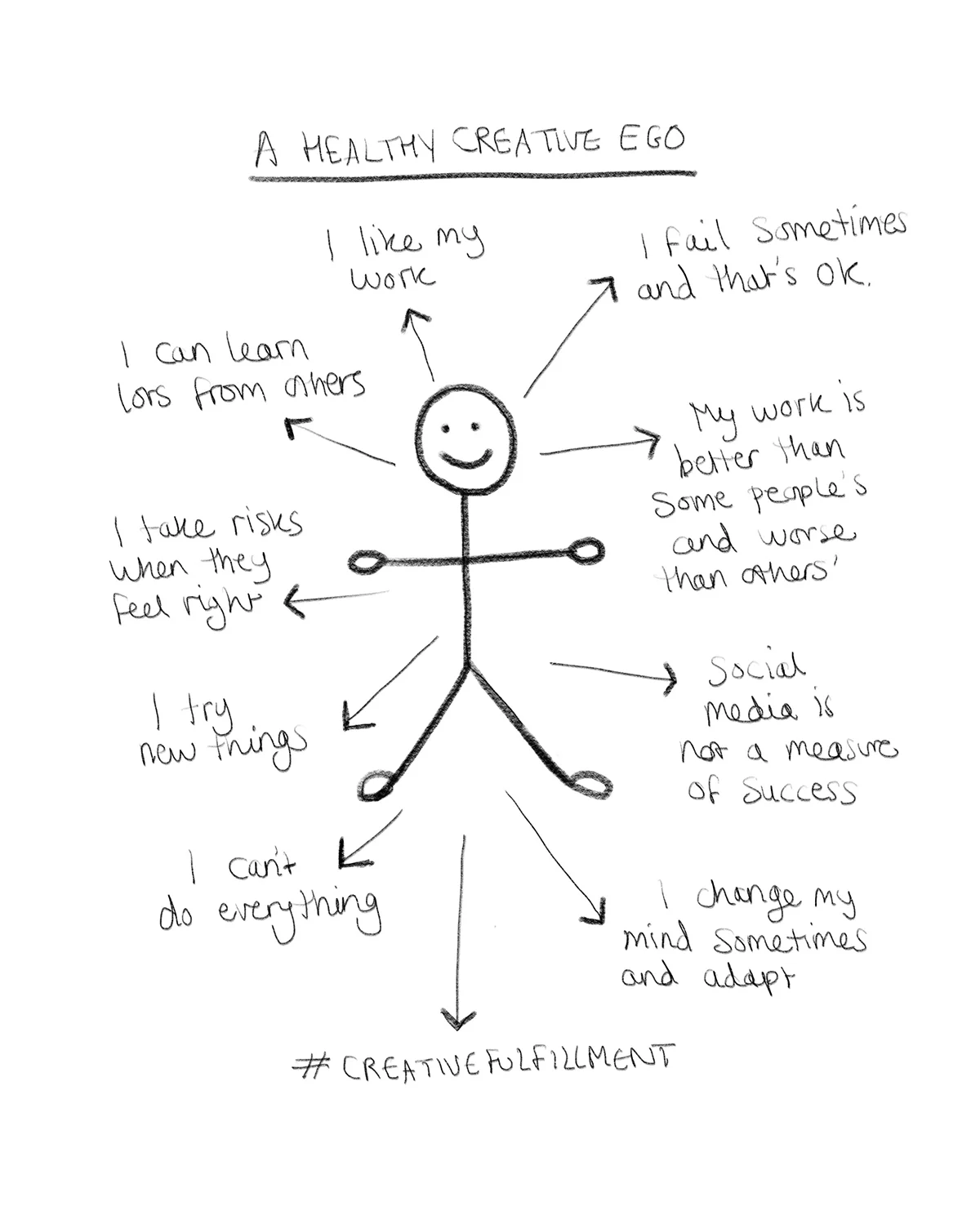How to let go of your creative ego
Photo: Orkun Azap
Let's face it, we all have an obsession with our egos – you might think you're exempt, but we are all lured in by affirmation and praise. There's nothing wrong with that of course, but what we choose to do with praise or critisism will define our work and careers.
The creative industry is particularly susceptible to unhealthy egos, our work is such that it often needs a good reaction in order to fulfil its purpose – whether that's influencing decisions, enhancing experiences or encouraging a sale. So how do we make sure we have healthy egos instead of over-inflated or deflated ones?
Good design gets attention and therefore if we create something good, we often get lots of attention in the process too – it gives us a great sense of reward getting the reaction we intended something to have – and of course we have a right to feel proud of the work we create. The issue comes when we are more attached to accolades over the day to day functionality of our work (and by this I do not mean that designs should be void of beauty, but that the main purpose of our work is usually not about us). Sure, we might find enjoyment in the process of creating, but if we are creative professionals then the end result is nearly always about somebody else's response to receiving or experiencing our work. Opinions matter to us greatly.
Social media is particulary difficult for creatives because it serves as both a platform to promote work and also a breeding ground for creative inadequacy. Work is compared and contrasted and instead of gaining inspiration we end up turning things into a numbers numbers game, more impressed with followers and likes over quality of work. The problem with all this is that the feel-good factor is slightly addictive and serves as a distraction over anything helpful to creative inspiration. Do you want the accolades more than you want to produce good work? Do you care more about your ego than creative development?
Ego is a very loaded word. In our culture ego has become something often associated with an overly inflated one, as opposed to one that is deflated. Stereotypes still come into play, with egos being predominantly associated with masculinity – you rarely hear anyone say 'she has a bit of an ego', for example, despite the fact women are just as susceptible. The 'feminine' version is all about 'self esteem' and 'self worth', but the core of it is the same – feeling good about ourselves and our work. The point is not whether you speak too highly or too lowly of yourself, but your obsession with whatever your 'self' is. In creativity that looks different for different people but here are the two illustrated extremes of unhealthy egos (Yes, I am a professional illustrator. Honest).
Unhealthy creative ego type no.1 is often associated with masculinity (please note, I'm not insinuating all men are like this but that it is more common). Perhaps because there are more male leaders in the creative industry, this is often the dominant ego type that influences our work - we think this is how we need to be to get the top, which is absolute bollocks.
Unhealthy creative ego type no.2. is often associated with feminitity (please note, I'm not insinuating all women are like this but that it is more common). This is the attitude a lot of woman have been brought up with - a false humility that is absolutely detrimental to creative work. It's all absolute bollocks.
Of course, there are plenty of females with ego type one and plenty of males with ego type two, and those with a complete pick and mix, but as I observe other creatives and the way they interract with one another, the stereotypes definitely prevail.
In the past I thought that what I needed to do to succeed was to become more like ego type number 1. When I doubted myself I hid all the things I found difficult, spoke more highly of myself than I felt and I tried saying yes to absolutely everything as opposed to tasks that truly suited me. The result was that I became stressed – putting on a front of percieved success and inside feeling that I just didn't cut it. But ego type two is equally unhealthy - if you do not believe in yourself and your work how do you expect others to?
So what's the solution? You want people to like your work and buy into it so of course you're not going to stop sharing it or gauging opinion. The problem is, if you're defined by your work then what happens if some people don't like what you're creating? Does it mean your work is rubbish? Of course not, but your 'ego' is damaged. What will your attitude be if you take on something new and fail at it? Are you free to learn from it or does it define you in some way? Does the discomfort of vulnerability stop you from asking for help from other talented people? Could you be producing better creative work through collaboration instead of thinking you know it all?
A healthy ego is based on consideration, intuition and problem solving. Neither praise nor critisism are taken too seriously because it is outward looking. It is neither perceived as masculine or feminine.
What this all comes down to is that creativity not about you, but the work. You are not your work. (I repeat: you are not your work). That's a weight off you right there - because when you fail at it it doesn't make you a failure. In the same way, when you achieve success, this is not solely down to you but the people who've helped you and the things you have learnt along the way. There's also no pressure on you to keep up some sort of air of superiority if you win awards and accolades – it's not about you but the work. Are you prepared to try new things if it means it won't impress those at design competitions? Are you prepared to take risks with your work in order to fulfill a brief better, even if it means you are publically critisised for doing something different? Are you too easily impressed by the praise of those who have 'made it' in your eyes, as opposed to taking on board comments that are truly helpful to your work?
Some helpful questions:
What can I to do to make better work?
Who can I ask for help?
Who can I help?
What is holding me back from creating the work I want to create?
What new thing could I try?
Can I work in collaboration?
Do I need to take on other roles to aid my work (even if they're perceived as 'less successful' to others)
What things can I give up on that aren't working?
What can I do for just a season or limited time?
We need to take a step back from our work and see it for what it truly is. Your failures do not make any previous successes nul and void, and in fact they may be the root of many future successes too. You're free to change your mind, ask for help and do things that make you look absolutely bonkers – the pressure is entirely off in the quest for groundbreaking creativity. Try new things, make mistakes, ask for help, share your stories...
What has helped you to have a positive attitude towards your work?




